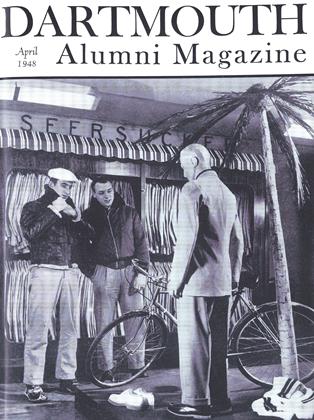GORE VIDAL sent me an inscribed copy of his newest novel, The City and thePillar (Dutton, 1948) and lest I be biased I asked Mrs. Albert I. Dickerson to write a brief review for me. This is what she wrote: "Ostensibly this is a story about a homosexual and his disastrous attempt to recapturethe essence of an adolescent experience. Actually it is also a thoughtful presentation of the position of the homosexual in this country. In the course of Jim Willard's drifting, he comes in contact with the whole hierarchy of inversion from Hollywood stars, through professors mouthing Wylie and Strecker, to New York truck drivers.
"Mr. Vidal explores the subject with thoroughness both objectively and subjectively yet contrives by his straighforward attack and stripped prose to skirt expertly around the pitfalls of emotionalism and special pleading and to give the book a healthy quality. From this quality, it seems to me the ending somewhat de- tracts. If we are to accept Jim as a decent rather average American youth, deviating from the norm in only one respect, then the violence of the closing episode would seem not only to be completely unmotivated (most certainly it is insufficiently adumbrated) but to violate the whole tone of the novel. One can appreciate the temptation of the parallel of the wrestling, set off by the dark contrast of love and hate, life and death, but it is a temptation which I, for one, cannot help but feel Mr. Vidal might well have resisted."
P. P. Howe's The Life of William Hazlitt first appeared in 1922 and there is now a new edition, with an interesting preface by Frank Swinnerton, issued in 1947 by Hamish Hamilton. This book is acknowledged to be the standard work on Hazlitt as well as one of the best biographies of our time. It seems to me to be just that. It is, indeed, the first really complete life of this painter, critic, and marvellous prose stylist who died at 52, and who lies buried in Soho, of blessed memory, in London. After savoring this book over two or three weeks I turned once again to Geoffrey Keynes' edition of Hazlitt's writings issued by the Nonesuch Press in 1930. They were well worth a reperusal, and if there is anybody remotely as good writing today I don't know who he is.
Then I came across the Autobiographyof William Cobbett, edited by William Reitzel, and issued in London in 1947. The editor, from Cobbett's various writings, chose autobiographical passages and wove them together, mainly from RuralRides, 1830, Life and Adventures of PeterPorcupine, 1796, the Political Register, iBo4ff-, and A Year's Residence, 1822. The vicissitudes of an early radical who worked for economic and political justice is pleasantly revealed. Those who know anything of the career of Thomas Paine will not be surprised at the revelations.
I am finding The Journal of Sir WalterScott, 1829-1832, also entertaining. Scott is one of the finest characters in all literature and many entries have a poignant quality which makes them genuinely moving. Revised edition issued in 1946.
Lest you may think I am going a little too highbrow I hasten to recommend Angela Thirkell's new novel Private Enterprise (Knopf, 1948) which has a map of Barchester, High Rising, Pomfret Madrigal, and Winter Underdose, and tells of the resignation of Mr. Birkett as headmaster of Southbridge School, of how Colonel Crofts becomes Vicar of Southbridge, of the lovely widow, Mrs. Arbuthnot, and the havoc she causes, of the ever charming Mrs. Brandon, and other wellknown residents of Barchester. If you are a Thirkell fan, and they are increasing (I noted this book was on the best-seller lists), you can't go wrong with this light, smooth, amusing, and at times a little bitter, novel. If you aren't a Thirkell fan you ought to be.
The Tennessee, by Donald Davidson, one of the Rivers series, begins with the Civil War, in which Grant and Sherman got valuable experience, tells of the Battle of Pittsburgh Landing, about which I knew nothing, of the Ku Klux Klan under General N. Bedford Forrest, and finally of the great industrial expansion under TVA with the conquering of Muscle Shoals. Better than many in the series.
The late Frank C. Lockwood's excellent book The Apache Indians (Macmillan, 1938) is a comprehensive and detailed history of the Apaches from their earliest contact with the Spanish in Mexico to the present time. In many respects these savages were superior to the whites who finally conquered them. The author writes with skill concerning the injustices of the Government as well as the savagery and treachery of the Apaches.
 View Full Issue
View Full Issue
More From This Issue
-
 Article
ArticleStumps and Scholarships
April 1948 By ROBERT S. MONAHAN '29 -
 Class Notes
Class Notes1942
April 1948 By JAMES L. FARLEY, JOHN H. HARRIMAN, ADDISON L. WINSHIP II -
 Class Notes
Class Notes1897
April 1948 By WILLIAM H. HAM, WELD A. ROLLINS, MORTON C. TUTTLE -
 Class Notes
Class Notes1918
April 1948 By ERNEST H. EARLEY, DONALD L. BARR, DAVID L. GARRATT -
 Class Notes
Class Notes1931
April 1948 By A. W. LAUGHTON, WILLIAM H. SCHULDENFREI, ERNEST H. MOORE -
 Class Notes
Class Notes1919
April 1948 By J. K. HUNTINGTON, MAX A. NORTON, ROSCOE .A. HAYES
HERBERT F. WEST 22
Article
-
 Article
ArticleBUREAU OF UNIVERSITY TRAVEL ANNOUNCES NEW PLANS
March, 1922 -
 Article
ArticleNEW ENGLAND STATES
December 1924 -
 Article
ArticleAlumni Fund at $800,000
MAY 1969 -
 Article
ArticleNewsletter Editor of the Year
JUNE 1972 -
 Article
ArticleTuck School
June 1941 By G. W. Woodworth -
 Article
ArticleThayer School
May 1946 By JOHN H. MINNICH '29.



